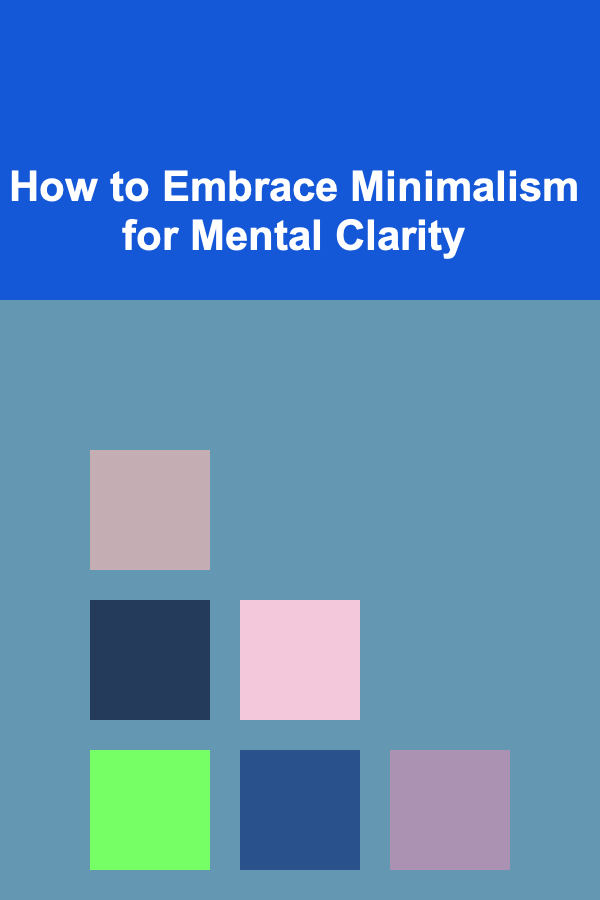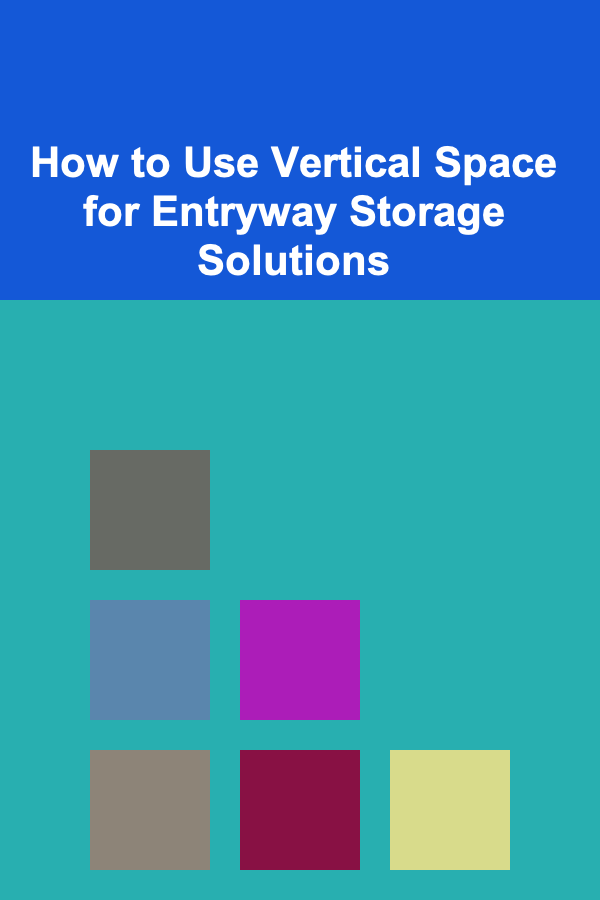
How to Embrace Minimalism for Mental Clarity
ebook include PDF & Audio bundle (Micro Guide)
$12.99$10.99
Limited Time Offer! Order within the next:

In a world that constantly demands more --- more stuff, more tasks, more distractions --- finding clarity can seem like an impossible task. Yet, there is a movement that offers a path toward calmness and purpose: minimalism. Minimalism is often associated with living with fewer possessions, but its impact stretches far beyond material goods. It offers a way of thinking that can help clear the mental clutter and pave the way for improved mental clarity. In this article, we will explore how embracing minimalism can foster mental clarity, how to begin simplifying your life, and the benefits of minimalism for your mental health.
The Concept of Minimalism
Minimalism, at its core, is about making room for what truly matters. It is about removing the excess, whether it be physical, emotional, or mental, so that you can focus on the things that bring value, meaning, and joy to your life. Minimalism isn't about deprivation, but rather about intentional living. The idea is to cultivate a life filled with purpose, not stuff.
Minimalism Beyond Material Possessions
While the most visible form of minimalism revolves around decluttering your physical space, it extends much deeper. Minimalism can touch on every area of your life --- relationships, time, mental energy, and even your work. Embracing minimalism is about shedding distractions and focusing on what adds value to your personal well-being and growth. It can help you make intentional decisions and create an environment that supports your mental health.
The Link Between Minimalism and Mental Clarity
Our minds, like our environments, can become cluttered with information, thoughts, and tasks that pull us in different directions. This mental clutter can create confusion, stress, and anxiety. A cluttered mind makes it difficult to focus, make decisions, and process emotions effectively. By embracing minimalism, we can reduce mental noise and create space for greater focus and clarity.
Mental clarity refers to the ability to think clearly and make decisions without being clouded by distractions. It's the mental state where you can process your thoughts, emotions, and external stimuli efficiently. Minimalism helps you achieve mental clarity by:
- Reducing external distractions: By eliminating unnecessary possessions, you remove the distractions that come with them. A clean and organized space allows for a clearer mind.
- Simplifying decision-making: When you remove excess choices, tasks, and commitments, you simplify the decision-making process, reducing decision fatigue.
- Fostering mindfulness: Minimalism encourages being present in the moment, helping you focus on what's truly important and letting go of the clutter that holds you back.
The Psychological Benefits of Minimalism
Adopting a minimalist lifestyle can offer numerous psychological benefits that directly contribute to mental clarity.
1. Reduced Anxiety and Stress
A cluttered space can lead to a cluttered mind. Research has shown that physical clutter can elevate cortisol levels (the stress hormone), which can contribute to feelings of anxiety and stress. By reducing the amount of stuff you own and organize your space, you are indirectly helping to reduce your anxiety. A minimalist environment offers a peaceful, calming atmosphere, allowing you to relax and think more clearly.
2. Increased Focus and Productivity
Minimalism forces you to prioritize what matters most, which inherently increases your focus. By eliminating distractions and unnecessary commitments, you can devote your attention to the tasks that matter most. This enhanced focus can improve your productivity and help you make better decisions. With fewer things vying for your attention, your mind can become a more efficient tool.
3. Better Emotional Health
When we accumulate possessions, tasks, and commitments, they can weigh heavily on our emotional well-being. Minimalism encourages letting go of emotional baggage, whether it's relationships that drain you or material goods that represent past decisions. By letting go of things that no longer serve you, you open space for emotional healing and mental clarity.
4. Improved Time Management
One of the primary benefits of minimalism is its effect on time. When you simplify your life, you can make more time for what matters. Whether it's spending time with loved ones, pursuing a passion, or engaging in self-care, minimalism allows you to reduce the time spent on trivial activities. This more intentional use of time leads to a greater sense of fulfillment and clarity.
Steps to Embrace Minimalism for Mental Clarity
Embracing minimalism for mental clarity requires a shift in mindset and a gradual process of simplification. Here are some steps to help you get started.
1. Declutter Your Physical Space
The first and most immediate step to experiencing the benefits of minimalism is to declutter your physical environment. Start with one area of your life that feels the most overwhelming, whether it's your home, office, or digital space.
Tips for Decluttering:
- Begin with small areas: Don't try to tackle everything at once. Start with one room or even one drawer.
- Ask yourself what you need: For each item, ask yourself if it serves a purpose, brings joy, or aligns with your goals.
- Let go of the unnecessary: Be mindful of sentimental items, but remember that they don't need to take up physical space to retain their meaning. If something is not adding value to your life, consider donating, selling, or discarding it.
- Organize as you go: Once you've removed unnecessary items, create a system that will help keep things organized moving forward. Invest in storage solutions that help maintain a clean and clear environment.
2. Simplify Your Digital Life
In our modern world, digital clutter is just as overwhelming as physical clutter. Emails, social media notifications, and countless apps and files can overload your mind. Streamlining your digital life can help reduce distractions and improve your mental clarity.
Tips for Digital Minimalism:
- Unsubscribe and unfollow: Unsubscribe from email lists, and unfollow social media accounts that no longer serve your interests or add value to your life.
- Declutter your digital devices: Delete unused apps, clean out files, and organize your folders for easy access.
- Limit screen time: Set boundaries for your digital consumption. Designate certain times of the day for social media or email checking, and resist the urge to be constantly connected.
- Use minimalist apps: Choose apps and tools that streamline your tasks and keep things simple. For instance, note-taking apps that offer simple interfaces or to-do list apps with minimal features.
3. Declutter Your Mind
Just as clutter accumulates in your physical space, it can also pile up in your mind. To embrace minimalism for mental clarity, you must actively work to declutter your thoughts.
Tips for Mental Decluttering:
- Practice mindfulness and meditation: Mindfulness practices help you become aware of your thoughts and feelings without judgment. Regular meditation can train your mind to focus and release unnecessary thoughts.
- Journaling: Writing down your thoughts, feelings, and ideas can help you organize your mind and reduce mental clutter. Use journaling as a tool for reflection and clarity.
- Simplify your commitments: Review your calendar and responsibilities. Eliminate activities and commitments that drain your energy or don't align with your values. Learn to say no to things that don't serve your mental well-being.
- Focus on one task at a time: Multitasking can lead to mental overload. Instead, concentrate on one task, complete it, and then move on to the next.
4. Prioritize What Matters
Minimalism is not just about removing the unnecessary; it's also about making room for what truly matters. This requires a shift in mindset to prioritize your values, passions, and well-being.
Tips for Prioritization:
- Define your values: What matters most to you? Family, career, health, creativity? Identifying your core values helps you make decisions that align with your purpose.
- Set clear goals: Minimalism encourages focus. Set specific, achievable goals that contribute to your well-being and happiness.
- Invest time in self-care: Self-care is essential for mental clarity. Make time for activities that nurture your mind, body, and spirit.
5. Embrace a Minimalist Lifestyle
Finally, to fully experience the benefits of minimalism, you must adopt a minimalist lifestyle. This means choosing quality over quantity, living intentionally, and being mindful of your consumption in all areas of your life.
Lifestyle Changes:
- Live with intention: Make mindful choices about where you spend your time, money, and energy.
- Buy less, choose wisely: When acquiring new possessions, consider whether they add real value to your life.
- Practice gratitude: Appreciate what you have rather than constantly seeking more. Gratitude shifts your mindset from scarcity to abundance.
The Long-Term Benefits of Minimalism for Mental Clarity
As you continue to embrace minimalism, the long-term benefits become even more apparent. A minimalist lifestyle helps cultivate a peaceful, focused, and purposeful life, creating lasting mental clarity.
1. Sustained Emotional Balance
With fewer distractions and commitments, you can maintain a sense of emotional balance. Your environment, both physical and mental, becomes an anchor, allowing you to stay grounded and resilient in the face of life's challenges.
2. Improved Problem-Solving Skills
Minimalism helps you simplify decision-making, which improves your problem-solving abilities. You are able to approach challenges with a clear mind and make better decisions that align with your values.
3. Greater Fulfillment and Contentment
By focusing on what truly matters, you begin to experience more fulfillment in your life. You no longer feel burdened by excess possessions, obligations, or mental clutter. Instead, you find contentment in simplicity, leading to a more peaceful and fulfilling existence.
Conclusion
Embracing minimalism for mental clarity is a powerful and transformative process. By decluttering your physical, digital, and mental spaces, you create room for focus, calm, and purpose. Minimalism is not about deprivation, but about making intentional choices that align with your values and bring meaning to your life. Through mindful practices and lifestyle changes, you can experience the profound benefits of mental clarity and live a life of greater fulfillment.

Becoming a UX/UI Designer: Key Strategies for Crafting User-Centered Designs
Read More
How to Create an Edible Landscape
Read More
How to Decorate Your Mantel for a Beautiful Holiday Look
Read More
How to Prevent Car Break-ins in Your Driveway
Read More
How to Store Seasonal Linens and Bedding in the Laundry Room
Read More
How to Use Vertical Space for Entryway Storage Solutions
Read MoreOther Products

Becoming a UX/UI Designer: Key Strategies for Crafting User-Centered Designs
Read More
How to Create an Edible Landscape
Read More
How to Decorate Your Mantel for a Beautiful Holiday Look
Read More
How to Prevent Car Break-ins in Your Driveway
Read More
How to Store Seasonal Linens and Bedding in the Laundry Room
Read More